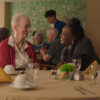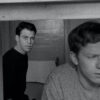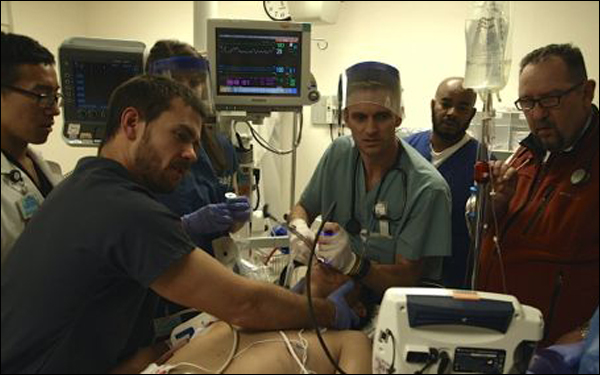Ryan McGarry doesn’t look like one to tire easily. In fact, he was once a competitive cross-country runner. Yet unlike most filmmakers at the L.A. Film Festival, the marathon experience of screening his first feature and dashing off from one interview to another is a mere jog when compared to his day job as a doctor in the emergency room at L.A. County General.
“I haven’t taken a vacation in four years,” says McGarry, donning summer attire complete with sunglasses. “I’ve had to negotiate with some of my resident classmates to get a random Tuesday off so that I can meet with one of our funders, which means I’ve had to work there on the weekend. Being exhausted from residency has its own issues, throwing in the stresses of a motion picture on top of that? Sometimes that feels like uncharted territory.”
Naturally, the resulting film “Code Black” feels the same way, plunging audiences into County General’s ER with an intimacy and intensity that’s usually only reserved for those who work there. Introduced with a glimpse of the hospital’s old C-Booth section where dozens of doctors pore over patients’ crash carts as if they were omnivorous insects over pieces of fresh food, the documentary threatens to exhaust its audience mere moments in when in actuality the initial shock opens up all the senses for an exuberant, ground-level view of the health care system.
With his cameras rolling since 2008, McGarry stumbles upon a transitional period for the hospital, traditionally a last refuge for the uninsured as a public medical facility, as earthquake standards force a relocation. The move may bring the physical building up to date, but as McGarry and his fellow first-years soon learn, it comes with additional layers of bureaucracy which the staff were once protected against in their old digs because of exemptions, putting far more distance between the doctors and their patients.
Yet “Code Black” brings viewers closer to a subject that’s so often depersonalized, profiling a group of physicians both energized by what they do and aggravated by the system they work in, all of whom were led into medicine for fascinating personal reasons. Armed with such a cast, McGarry’s film has the same warm bedside manner as any of these doctors are shown demonstrating throughout and while McGarry had a rare break from both his residency and the festival, which programmed “Code Black” for an unprecedented four screenings, he spoke about the overlap between filmmaking and medicine and how “Code Black” is an extension of the care he provides in the ER.
Did you immediately think you wanted to pick up a camera when you came out here to pursue medicine?
I’d always hoped to combine filmmaking and medicine, but I didn’t think it would happen until after residency. And I did that out of thought that maybe I could get a unique filmmaker point of view of the world through med school as opposed to doing film school, then I would just apprentice and teach myself the tech things on the side. But here I was as a visiting med student at the University of Pittsburgh who had come here to L.A. to see this hospital where I could potentially train as an ER doctor and as soon as I saw it, I was like, “holy shit. This is madness here.” People would not believe how many uninsured patients are here. They would not believe how many traumas come in, they would not believe the level of intensity that’s normal all night long and they wouldn’t believe these doctors and nurses and staff members who have to do it. It’s insane. So basically, I thought this should be a film and approached the chairman at the time with the idea that if anything, we should record this for archival purposes and that became this feature film.
How did this evolve from your initial idea of what it would be when you started as a med student in 2008? You must not have known that the hospital would undergo such a radical transformation.
I thought initially that I would record this extraordinary footage of the old hospital and at that point, we knew within a few months that the old hospital was going to close. I was interested in that idea visually alone, like what happens when this 80-year institution of public health and service is suddenly silenced. Granted, it’s not like the county hospital is dead. They moved to a new location next door. But this was a place that has never been closed and never shut down. This one room called C-Booth, which is one of the focuses of the early part of the film, people were like, “No one’s ever turned the lights off here. We don’t even know where the switch is.”
So alone, I thought this could be a really interesting short and there were characters — these physicians were just amazing. There’s this guy who would be smoking after every other patient, yet was brilliant and such a good doctor, so it was just fascinating. To my surprise, and this is the ride of the documentary, when I committed to USC to be a training doctor there, I came back after the move to the new hospital and I’m like, “Whoa, something’s different here. I don’t know what it is yet, but something’s different.” So that led to this incredibly different direction for the film and this whole idea that we were launched into the modern era of health care whereas before the institution was operating by exception in another time.
It’s amazing that the building you’re working in could have so much of an effect, especially when it has nothing to do with physical aspects, but how it reclassifies everything in the eyes of the organizations that oversee it.
There’s a lot of nostalgia for the old hospital. Any building that has that type of feeling, the inscription in its walls and this sense of importance, that’s important for physicians. That’s important for nurses. And it’s important for patients. The entire equation is served best by a space that maximizes the feeling of what’s at stake. When you take that away, does anyone feel bad for doctors and nurses? I mean, come on, we get to save lives. That’s a very important role as is. I’m not suggesting that. But I think what I am suggesting is that a sense of place and as sense of heritage is really important in a field like health care that’s often assaulted as far as it’s morale.
One of the things you mentioned in the post-screening Q & A was how you could make a short film simply about how you went about getting consent from patients to appear in the film since when you’re filming them, they might not be aware or even conscious that you were doing so, but you’d go back and show them the footage of their medical emergency. Was watching them see the care they receive actually help shape what you wanted to do as a filmmaker?
It’s funny. It had more to do with shaping me as a physician. Again, I’m dead serious there’s a lot of overlap here [between filmmaking and medicine], that as a doctor, you’re constantly critiquing yourself about how’s the performance? How am I doing? Am I really sort of taking care of this arc that is this person’s acute phase of their illness? To see the patient’s reaction to that care was fascinating because usually as physicians, we often get to study film of ourselves, but it’s rare that you get to do it with the patient after the fact. Gosh, I could probably start some new form of educational feedback on that because that’s extraordinarily powerful. In medical school, we’d have fake patients who were actors who would come in and give you feedback after your session. That was valuable, but the notion of watching them watch their care and then doing that with the patient was totally mindblowing.
Being a doctor, you probably don’t get too nervous about anything, but what was the premiere like?
The premiere was a huge sense of relief in some ways. There’s no more difficult crowd that physicians, so to have their final stamp of approval was really a welcome moment. This has been a very physical film for myself personally. It’s not like I could call up somebody and be like, “Yeah, you remember when you were making your film and doing your residency?” That’s a unique position to be in and I’m not saying it was a wise one either, by the way — I’m totally single, exhausted and everything else. But that premiere was fantastic.
“Code Black” will open in New York on June 20th, Los Angeles on June 27th and play throughout the country in coming weeks. A full schedule is here.




